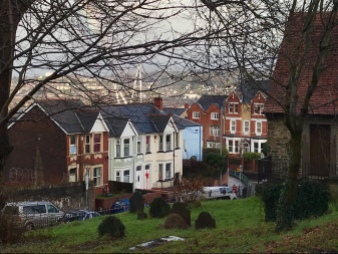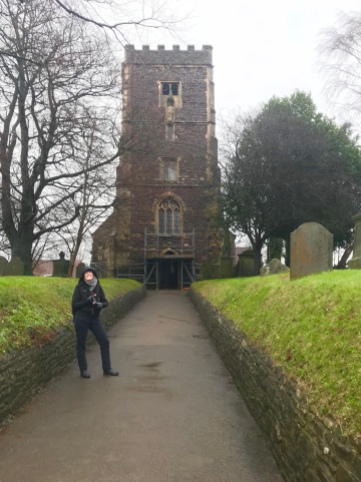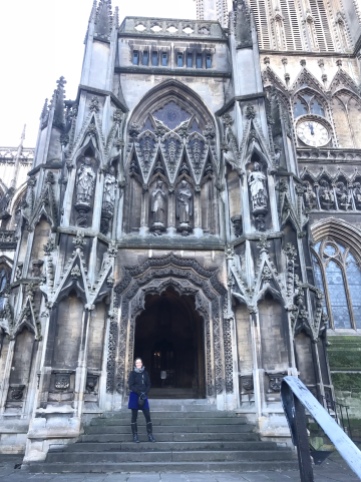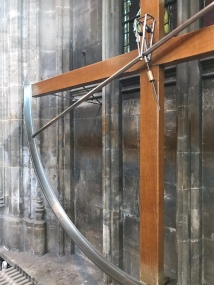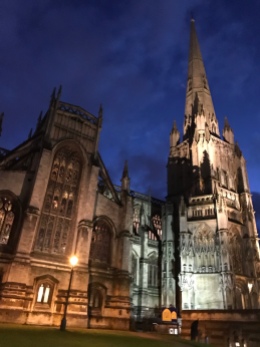I’ve produced a report of the work I’ve done in the past year, and thought that readers of this blog might be interested to see it. Not the most thrilling reading, but it might be useful to other MSCA Individual Fellows to see how I’ve structured this, and what I’ve managed to achieve in twelve months as a Research Fellow at University College London.
MSCA Log of Activities conducted in the first year by MSCA IF Prof. Shannon Chance
(01 January 2018 – 31 December 2018)
This interim report summarizes work and achievements resulting from year one of a Marie Sklodowska-Curie Actions (MSCA) fellowship provided the European Union. This fellowship runs 1 January 2018 until 31 December 2019.
Call identifier H2020-MSCA-IF-2016
Project number 747069
Project acronym DesignEng
Project title Designing Engineers: Harnessing the Power of Design Projects to Spur Cognitive and Epistemological Development of STEM Students
We are delighted to report outcomes of the training and mutual learning of MSCA Research Fellow Professor Shannon Chance alongside her primary MSCA supervisor Professor Nick Tyler, her informal second MSCA supervisor Professor John Mitchell, her colleagues from University College London (UCL) and its Centre for Engineering Education (CEE), and her colleagues from Technological University Dublin (TU Dublin, formerly DIT) and its CREATE research group. The achievements identified in this report reflect the positive learning environment at the host institution (UCL) and ongoing positive relationships with the home institution (TU Dublin).
This mid-project report provides a log of activities conducted in 2018, the first 12 months of this fellowship, by MSCA Research Fellow Professor Shannon Chance. The work plan proposed in the fellowship application has been followed, and the researcher development activities promised in the six Work Packages are on track. Allowing for a small degree of variation from details of original proposal yet thoroughly meeting the intent—at the overall level as well as within each work package—we report that all milestones have been met, and all promised items have been either produced or on track to be produced on time.
WP1, Qualitative studies
Conducted interviews with 15 final-year women studying engineering in Ireland, and worked with teachers at my home institution to implement findings to enhance their teaching practice.
Designed a research study and conducted a literature review on global responsibility in civil engineering. Obtained ethics approval to proceed with the study. Prepared an extensive mid-project report for Engineers without Borders UK.
Designed a study on conceptualizations of architecture and civil engineering students, obtained ethics approval to proceed with the study, and conducted three pilot interviews to test the interview protocol.
Assisted in the design of a study of student experiences and expectations in UCL’s Integrated Engineering Programme (IEP) and provided advice throughout the ethics application and data collection process.
Assisted in the development of a manuscript reporting a systematic review of the literature on “grit”.
Published three conference papers disseminating findings of my empirical research under this work package and presented them at ASEE, ICL, and SEFI.
- CHANCE, S. M. & Williams, W. (2018). Preliminary findings of a phenomenological study of Middle Eastern women’s experiences studying engineering in Ireland. American Society for Engineering Education (ASEE) conference in Salt Lake City, Utah.
- CHANCE, S. M. & Direito, I. (2018). Preliminary findings of a systematic review of doctoral theses in engineering education that have used phenomenological methods. European Society for Engineering Education (SEFI) conference in Copenhagen, Denmark.
- CHANCE, S. M. & Williams, W. (2018). Middle Eastern Women’s Experiences of Collaborative Learning in Engineering in Ireland. International Conference on Interactive Collaborative Learning (ICL) in Kos Island, Greece.
Submitted the final draft for publication (based on a 2017 conference presentation) in the proceedings of the UK Royal Academy of Engineering’s EERN, Engineering Education Research Network
Submitted a draft journal article to SRHE’s consultant for the journal PRHE for advice.
- CHANCE, S. M., Maguire, R., Direito, I., Gleeson-Mills, A., & Eddy, P. L. (first draft). National STEM educational policies: Their relation to girls’ experiences in physics across Europe and to the engineering pipeline. Policy Reviews in Higher Education.
Made additional presentations of my empirical research under this work package at SRHE and EERN:
- CHANCE, S. M. (2018). Summary of National STEM Educational Policies in Relation to Girls’ Experiences in Physics in Europe and into the Engineering Pipeline. Society for Research in Higher Education conference 2018 in Newcastle, UK.
- CHANCE, S. M. (2018). Summary of National STEM Educational Policies in Relation to Girls’ Experiences in Physics in Europe and into the Engineering Pipeline. Society for Research in Higher Education conference 2018 in Newcastle, UK.
- Leão, C. P., Soares, F., Williams, B., & CHANCE, S. (2018). Challenges, experiences and advantages in being a female engineering student: Voices in the first person. Presentation at the UK & Ireland Engineering Education Research Network (EERN) annual conference 2018 in Portsmouth.

Presentation at SRHE 2018
WP2, Mixed-methods study
Published one conference paper and delivered one presentation, disseminating findings of my empirical research under this work package.
- CHANCE, S. M. & Duffy, G. (2018). A model for spurring organizational change based on faculty experiences working together to implement Problem-Based Learning. American Society for Engineering Education (ASEE) conference in Salt Lake City, Utah.
Submitted a complete manuscript that uses multiple methodologies for review by EJEE, received instructions to revise and resubmit, and submitted a revised version for the second round of peer reviews.
- CHANCE, S. M., Duffy, G., & Bowe, B. (in press). Comparing grounded theory and phenomenology as methods to understand lived experience of engineering educators implementing Problem-Based Learning. European Journal of Engineering Education.

Recent journals on engineering and higher education
WP3, Special focus journal
(I proposed delivering one special focus issue over two years and have exceeded this goal.)
Spearheaded a special focus issue on diversity in electrical and electronic engineering that was published November 2018, and served as lead author of the guest editors’ statement.
- CHANCE, S., Bottomly, L., Panetta, K., & Williams, B. (Eds.). (November, 2018). Special focus issue on gender in engineering in the IEEE Transactions on Education.
- CHANCE, S., Bottomly, L., Panetta, K., & Williams, B. (Eds.). (November, 2018). Guest Editorial Special Issue on Increasing the Socio-Cultural Diversity of Electrical and Computer Engineering and Related Fields. IEEE Transactions on Education, (61)4, 261-264.
I am spearheading another special focus issue on using design to spur epistemological and identity development among engineering students underway and ahead of schedule: Call for papers issued (m1), Proposals arrive (m4), Proposals selected for continuation (m6), Full drafts received (m14), Reviews returned to authors (m16), Finals submitted for re-review (m19).
- CHANCE, S., Williams, B., Goldfinch, T., Adams, R. S., & Fleming, L. N. (Eds.). (forthcoming, 2019). Special focus issue on using design projects to spur cognitive development of students in science and engineering n the IEEE Transactions on Education.
Produced PBL encyclopedia entry.
- CHANCE, S. M. (forthcoming). Problem-Based Learning: Use in Engineering Disciplines. In Amey, M. J. & David, M. E. (Eds.). The SAGE Encyclopedia of Higher Education, 5v. Thousand Oaks, CA: Sage.

Learning from experts like phenomenographer Dr. Mike Miminiris
WP4, Outreach activities
(I proposed delivering 19 outreach events/outputs over two years.)
Outreach to General Public
(In 2018, 5 workshops, 1 booth, 1 book publisher advised, 2 educational websites)
Directly conducted 4 robotics and electrical engineering workshops for kids in Ireland with colleagues from my home institution. Having co-founded RoboSlam robotics outreach team in 2013, I continue to be active in RoboSlam, as one of the four main coordinators of events. In 2018, was part of a team that ran a number of robotics and electrical engineering workshops for kids in Ireland over the month of August with the Wexford library service. I specifically assisted in running two workshops in Bunclody (17th August) and two in Enniscorthy (18th August). The workshops were attended by approximately 120 children in the age range 8-12. The children built an electronics arcade game which they brought home afterwards. The intention of the workshops was to encourage an interest in electronics and programming. Feedback and pictures (courtesy of Shannon Chance) are available here: https://www.dropbox.com/home/DIT%20Bread%20Board%20Games. The technical resources we used (instructions, and code) can be found here: https://ioprog.com/bbg.
Operated an educational booth on electrical engineering in Ireland with colleagues from my home institution, at Dublin Maker 2018. A large team of volunteers (staff and students) from the school participated in Dublin Maker in Merrion Square in mid-July 2018. The common theme of our stand was “paper programming”.
Provided support for the EI sponsored Engineer Your Future Week summer school for TY students in mid-May. Our school’s contribution encompassed Robot Building and Biomedical Engineering.
STEM Activity Books for Kids—provided “expert advice” as the primary content consultant for activity books:
- Scribble Engineering, STEM activity book published by Usborne Publishing Ltd. (2018)
- Scribble Architecture, STEM activity book to be published by Usborne Publishing Ltd. (forthcoming)
Hosted and created content for an educational blog on being a mobile researcher that had 3,732 visitors in 2018 and 13,106 views (discrete clicks indicating engagement) with additional interaction via Linkedin, Twitter, and Facebook.
- CHANCE, S. (2012-present). Ireland by Chance: Research Adventures in Ireland and the UK. http://www.IrelandByChance.com showcasing research and fellowship activities
Provided content for a blog on robotics that I collaborative manage with colleagues from my host institution that had 3,299 visitors in 2018 and 6,505 views.
- Burke, T., CHANCE, S., Berry, D., & Duignan, F. (2012-present). RoboSlam: Robot-building for Beginners. Roboslam.com showcasing outreach activities I do with my colleagues in electrical engineering.

My colleagues in engineering education development and research at UCL.
Outreach to Support Educators
Provided workshops on teaching (learning theories and innovative teaching techniques) for educators.
- Akinmolayan, F. & CHANCE, S. M. (2018). Facilitating group & Problem-Based Learning in the context of engineering education. Two-day Master Class conducted for the University of Cape Town’s Engineering Education Existing Staff Capacity Enhancement Programme.
- CHANCE, S. M. (2019). Learning theories in engineering: A US perspective on student development. A class session for UCL’s new MSc in Engineering and Education.
- CHANCE, S. M. (2018). Supporting diverse students. Lunch seminar for UCL’s Centre for Engineering Education in London.
Outreach to Support Researchers
Provided workshops on research techniques for Early Stage Researchers.
- Direto, I., Malik, M., & CHANCE, S. M. (2018). Conducting Systematic Literature Reviews in Engineering Education Research. Workshop to the UK & Ireland Engineering Education Research Network (EERN) annual conference 2018 in Portsmouth.
- Edström, K., Bernhard, J., De Laet, T., & others including CHANCE, S. M. (2018). Doctoral Symposium. One-day pre-conference workshop at the European Society for Engineering Education (SEFI) 2018 annual conference in Copenhagen, Denmark.
- De Laet, T., Williams, B., & others including CHANCE, S. M. (2018). Engineering Education Research. Workshop by EER Working Group at the European Society for Engineering Education (SEFI) 2018 annual conference in Copenhagen, Denmark.
- CHANCE, S. M. (2018). MSCA fellowship experiences. Presentation delivered for Dublin Institute of Technology’s EPA & IUA MSCA Research Information Workshop Programme.
Provided presentations at symposia for experienced researchers
- CHANCE, S. M. (2018). Gender Equality in STEM Education. Presentation delivered at Marie Curie Alumni Association’s Gender Equality Workshop Programme on 3 December 2018 in Dublin, Ireland.
- Edström, K., Bernhard, J., van den Bogaard, M., Benson, L., Finelli, C., CHANCE, S. M., & Lyng, R. (2018). Reviewers, reviewers, reviewers! Workshop at the European Society for Engineering Education (SEFI) 2018 annual conference in Copenhagen, Denmark.
WP5, Training and transfer-of-knowledge
(I proposed attending 56 training sessions over two years and have exceeded this goal)
Researcher Training sessions completed
In chronological order:
- UCL online training module and certificate earned in Safety
- UCL online training module and certificate earned in Green Awareness
- UCL online training module and certificate earned as Green Champion
- UCL day-long Researcher Development Workshop, Finding Your Voice as an Academic Writer
- UCL day-long Researcher Development Workshop, An Introduction to Research Student Supervision at UCL
- Researcher information session organized by the Irish Research Council, Opportunities to collaborate with UK-based researchers
- UCL day-long Researcher Development Workshop, Creative Approach to Problem Solving and Decision Taking for Researchers
- UCL Arena Guidance Sessions: Initial Guidance
- UCL day-long Researcher Development Workshop, Leading Collaborative Projects
- UCL’s Centre for Engineering Education’s event, In Conversation With… Angela Saini and Louise Archer
- UCL AstreaVoices workshop: Choosing your journey
- UCL day-long Researcher Development Workshop, Writing Books and Book Chapters
- UCL day-long Researcher Development Workshop, Managing Your Reputation
- UCL Arena Senior Fellow Guidance Session: Developing your application
- UCL day-long Education Conference 2018 at the UCL Institute of Education
- Nathu Puri Institute Thought Leadership discussion and dinner in April
- SRHE day-long workshop, Migration and academic acculturation
- SRHE day-long workshop, Developing curriculum, learning and pedagogies in STEM subjects: the case of Engineering
- SRHE day-long workshop, Phenomenography: An approach to qualitative research in higher education
- UCL LLAKES Seminar by Louise Archer Why can’t we solve the science participation ‘crisis’? Understanding young people’s (non)participation in post-16 science
- Attended a UCL “Town Hall” to better understand the administrative structure of this research-intensive university, Finding a new place in society for universities
- UCL day-long Researcher Development Workshop Publish or Perish: Getting Collaborative Social Science Published
- One-day Inaugural Spring Colloquium of the UK-Ireland Engineering Education Research Network, held in Newcastle
- UCL day-long Researcher Development Workshop, The Superior Performer: How to Work to Your Strengths
- SRHE day-long workshop, Publishing Academic Articles: A way through the maze
- UCL Researcher Development Workshop, Induction for New UCL Research Staff
- Attended a half-day of UCL conference on Impacts of Gender Discourse on Polish Politics, Society & Culture Comparative Perspectives reservation
- UCL workshop, Provost’s Welcome to New Staff
- UCL day-long Researcher Development Workshop, Writing and Publishing Research Papers
- UCL day-long Researcher Development Workshop, Increasing Impact – Gaining Positive Media Coverage
- Attended two-day Inspirefest celebrating women in technology, held in Dublin
- Attended four-day conference of the American Society for Engineering Education (ASEE) in Salt Lake City
- Attended one-day symposium at the Royal Society sponsored by the RAEng and UCL CEE, Inclusive Engineering Education Symposium
- Second Nathu Puri Institute Thought Leadership Event at 6-9 Carlton House Terrace, London SW1Y 5AG
- Attended two-day 7th International Symposium of Engineering Education (ISEE 2018), hosted by UCL
- UCL day-long Researcher Development Workshop, Storytelling Skills for Teachers and Presenters
- UCL Arena training for fellowship applicants at principal level, PFHEA Lunch session
- Attended five-day conference of the European Society for Engineering Education (SEFI 2018) in Copenhagen
- Attended three-day International Conference on Interactive Collaborative Learning (ICL 2018) plus events of the International Conference on Engineering Pedagogy (IGIP 2018) in Kos Island, Greece
- UCL online training module and certificate earned in GDPR
- SRHE day-long workshop, IS THERE (STILL) ROOM FOR EDUCATION IN THE CONTEMPORARY UNIVERSITY? Exploring policy, research and practice through the lens of professional education. Seminar 3
- Lecture organized by the Irish Fulbright Commission, Creative Minds: In Conversation with a NASA Astronaut
- TU Dublin (formerly DIT) online training module and certificate earned in GDPR
- TU Dublin 2.5-hour workshop by Dr. Bill Williams, Getting published in engineering education research journals
- Attended half-day IEP Research Away (Half) Day
- Attended three-day Society for Research in Higher Education conference (SRHE 2018) in Newport, Wales

Exploring Athens between conferences
Research skills development activities
PhD/Research supervision
- Second supervisor for one PhD student at LSBU, Thomas Empson, meeting with him and the primary supervisor Professor Sushma Patel bi-monthly. Successfully guided him through (1) REES2 submission and panel interview gaining university permission to proceed, (2) ethics approval process, and (3) submission of abstract to EPDE conference that was accepted for development into a full paper.
- Co-supervising one PhD student at TU Dublin, Una Beagon.
- Supervised a group of students in The Civil Service Graduate Development Programme 2017-18 in Ireland in conducting a policy-related research project.
International Leadership Appointments in EER
- Appointed Associate Editor for the journal IEEE Transactions on Education. In addition to organizing the two special focus issues listed under WP3, I also provided advice to the Editor in Chief at the desk review stage, managed the review of multiple manuscripts, gave input into operational changes, and review manuscripts nominated for Best Paper.
- Appointed to and served on the Editorial Board of the European Journal of Engineering Education.
- Appointed to and serve as Governing Board member, global Research on Engineering Education Network (REEN) and providing leadership on the sub-committee for recruitment and selection of upcoming conference hosts.
- Appointed to the organizing group of the new Irish Chapter of the Marie Curie Alumni Association (MCAA). Joined international MCAA organization and both the Irish and UK chapters.
- Appointed to the SEFI Working Group on Engineering Education Research.
- Provided leadership to the Nathu Puri Institute at the London South Bank University as a think-tank member (2018) and by serving on the interview panel for the new director of the Institute.
- Appointed as Visiting Professor at London South Bank University.
- Invited to serve as a member of the Program Committee of the 11th Global Engineering Education Conference (EDUCON), which will take place in Porto, from 27-30 April 2020.
Journal Peer Reviews
- Reviewed manuscripts for the European Journal of Engineering Education (EJEE), including CEEE20160099, CEEE20180019, CEEE20170301, CEEE20180019.R1, CEEE20180086, and CEEE20180173.
- Reviewed manuscripts for the Journal of Engineering Education (JEE) manuscript JEE-2017-0238 and JEE-2017-0238.R1.
Conference Peer Reviews
- Provided reviews of three abstracts for the Research in Engineering Education Symposium to be held in 2019
- Provided peer reviews of four abstracts (contributions 1149, 1217, 1236, and 1384) for SEFI 2018.
- Served as meta-reviewer, breaking ties on three abstracts (contributions 1123, 1237, and 1242) for SEFI 2018.
- Reviewed one abstract (contribution 1194) for the 2018 ICL conference.
Educational Assessment
- Provided assessment of one proposal for Fulbright Ireland’s 2019-2020 Programme.
- Invited to serve on National Architectural Accreditation Board (NAAB) IPR Review Panel (forthcoming 2019).
- Invited to serve as Evaluator for EU grant proposals under the ERASMUS Program (forthcoming 2019).
- Provided a formal assessment of four MSc capstone thesis papers submitted at my home institution.
Curriculum Design and Education Development
- Provided input into the design of a new MSc in Applied Computing for professionals in Built Environment at her home institution.
- Provided advice for UCL’s new MSc Engineering and Education, launched in September 2018. This flexible and unique MSc is designed for anyone teaching in a department of engineering or working as an engineer or in engineering policy, who is aiming to: (a) lead change and enhance the performance of engineers in industry or (b) develop innovative strategies to improve the education of engineers, in either educational or work contexts. More information and apply at: https://www.ucl.ac.uk/prospective-students/graduate/taught/degrees/engineering-education-msc
- Provided input into the proposed new curriculum in architecture engineering for Newgiza University to be developed by my host institution.
- Developed links around accessible transport in London that are of importance to my home institution’s new MSc in Transport and Mobility. I am coordinating a visit of DIT’s MSc staff for spring 2019 to London to visit the world-recognized transportation testing facility headed by Professor Nick Tyler, CBE.
- Visited former colleagues and students in bridge and robot design modules during research trips to Dublin.
Fellowship applications
- Submitted a fellowship application to the British Academy that was not funded.
- Advised Dr. Inês Direito on preparing her won grant application for the Nuffield Foundation.
- Worked on developing an application for a HEA Teaching Fellowship.
Coaching and mentoring
- Advised researchers in Portugal (Filomena Soares and Celina Pinot Leao) who are collecting interview data to add to that I’ve collected with Dr. Bill Williams.
- Mentored multiple young past students and research participants and the person hired to cover me during my MSCA career break.
- Advised aspiring MSCA applicants.
- Provided references for past students and colleagues.
- Provided mentoring on PhD research design to a UCL colleague.
- Kept up with the achievements of my former architecture students via Facebook and LinkedIn (e.g., buildings designed, books launched, exams passed, professional registrations earned, challenges faced, lives well-lived.)
Miscellaneous
- Provided data to assist with UNESCO report on engineering.
- Worked to keep my research profiles up-to-date, including UCL Engineering, IRIS, LinkedIn, ORCId
- Nominated colleague Dr. Bill Williams for appointment as Visiting Professor at my home institution and assisted in organizing his inaugural lecture and a workshop for my home research group, called CREATE.
- Coordinated guest lecture at my host institution (UCL) by Dr. Mike Miminiris
- Provided interview for gender researcher Susana Vázquez Cupeiro
- Served as moderator of ISEE conference session organized by my host institution.
- Was featured in a two-page spread in DIT’s Research News, issued in March 2018, on women in STEM.
Received one-to-one training from research experts
- Mike Mimirinis, phenomographer
- Professor Nick Tyler
- Professor John Mitchell
- Bill Williams
- Professor Jenni Case
- Jeff Froyd
- Professor Brian Bowe
- Professor Anne Gardner
- Professor Pam Eddy
- Inês Direito
- Professor Shushma Patel
- Able Nyamapfene
- Claire Ellul GeoBIM – Linking Geographic Information Systems and Building Information Modelling
- Jenny Griffiths
- Professor Rao Bhamidimarri
- Kate Roach
- Folashade Akinmolayan
- Nicky Wolmarans
- Jay Derrick
- Emanuela Tilley
- Lorraine D’Arcy
- Avril Behan
- Kevin Gaughan
- Jean Cahill
- Amir Tobacovic
- Professor Ron Daniel
- Ted Burke
- Damon Berry
- Frank Duignan
- Professor Simon Phibin
- Georgia Pitts
- Elpedia Makriyannis
- Jeffrey Johnson
- Professor Euan Lindsay
- Andrew Forkes, Maker Labs at LSBU
- Alan Hilliard
- Rovani Sigamoney of UNESCO
- Rob Lawlor
- Fiona Truscott
- Conor O’Carroll
- Tony Fawcett, CEGE Communications and Marketing Manager
Attended CPD lectures to stay up-to-date in my field (architecture and urbanism)
- Attended two lectures on accessible transportation at PAMELA, UCL’s transportation research hub, delivered by Professor Nick Tyler
- UCL Architecture lecture, Sir Peter Cook of CRAB Studios
- UCL Architecture lecture, SueAnne Ware with University of Newcastle, Australia
- UCL Architecture lecture, Ken Yeang
- UCL Architecture lecture, Fabio Gramazio of ETH Zurich and Gramazio Kohler Research
- UCL Architecture lecture, Jeremy Till from UAL
- UCL Architecture lecture, Vera Bühlmann from Technical University of Berlin
- UCL Engineering event, presentations of BEAMS EPSRC Vacation Bursary Best Project nominations
- UCL Architecture lecture, Peg Rawes from The Bartlett
- UCL Engineering lecture, Designing a Road Traffic Model for the Cross-sectoral Analysis of Future National Infrastructure
- UCL Education Awards
- Architecture lecture by Grafton Architects
- TU Dublin lecture by Dr. Bill Williams, It’s not just about innovation: 14 ways engineers create value
- Attended DIT London Alumni Annual Reception at the London Irish Centre
Visited museum visits to stay up-to-date in my field (architecture and urbanism)
- Science Museum (including the Transportation exhibit)
- Bartlett exhibition on Street Life
- Tower Bridge with bride design exhibition
- Foundling Museum
- Tower of London
- Paris—San Chappelle, Arab Institute, Medieval Museum, Marie Curie Museum
- Saatchi Gallery
- V&A Museum
- British Museum (e.g., Egyptian exhibition)
- Courtard Gallery
- Folkestone Museum
- Dover Castle
- Royal Academy (Charles I)
- Whitechapel Gallery
- Sir John Soane Museum
- V&A Museum of Childhood (including Nordic Design exhibition)
- Apartheid Museums in Johannesburg
- Constitution Hill museum in Johannesburg
- National Gallery (exhibitions on Degas and Murillo)
- Wallace Collection
- History Museum in London
- UCL Art Museum, Octagon exhibition hall, and Library
- National Gallery (Monet and Architecture)
- Tate Modern (e.g., an exhibition on Modigliani)
- Tate Britain (e.g., an exhibition on Impressionists in London, and the Turner Prize)
- Somerset House (print exhibit & tour)
- Building Centre
- Institute of Making
- UCL Grant Museum of Archeology
- Open House Dublin (Normal House, Villas, Belvedere House, Ash House, 14 Henrietta Street, KS Garda St, Richmond Surgical)
- Udvar-Hazy Air and Space Museum
- Smithsonian Air and Space Museum
- Smithsonian East Wing
- Smithsonian Cochrane Gallery
- Smithsonian Museum of American History
Visited and studied cities to stay up-to-date in my field (architecture and urbanism)
- London, England
- Paris, France
- Folkestone, England
- Dover, England
- Johannesburg, SA
- Ramsgate, England
- Rye, England
- Nice and south of France
- Copenhagen, Denmark
- Athens, Greece
- Kos, Greece
- Newport, Wales
- Bristol, England
- Washington, DC
WP6, Management
- Attended pre-grant meetings with primary MSCA supervisor Professor Nick Tyler, second supervisor Professor John Mitchell, colleagues from the research center I was joining and the corollary center at my home institution to align plans and activities, including its head, Professor Brian Bowe.
- Attended a fellowship kick-off meeting with Professor Nick Tyler and second supervisor Professor John Mitchell.
- Developed an official Career Development Plan based on research and bespoke advice from Professor Nick Tyler.
- Attended a Month 1 Probationary Assessment with my supervisor, Professor Nick Tyler.
- Attended a Month 3 Probationary Assessment with my supervisor, Professor Nick Tyler.
- Attended a Month 6 Probationary Assessment with Professor Nick Tyler and submitted required documents to UCL.
- Held frequent discussions (bi-monthly) with my second supervisor, Professor John Mitchell.
- Held quarterly discussions with my former MSCA supervisor, Professor Brian Bowe.
- Attended a one-year review discussion with supervisor Nick Tyler.
- Prepared and submitted a log of activities to be included in the mid-project report to the European Commission.
 By the late afternoon, the sick one had moved into a conference room to work, but it was too late.
By the late afternoon, the sick one had moved into a conference room to work, but it was too late.

 When you’re supervising a Ph.D. student, s/he usually comes to you for meetings. In my case, however, I travel over to LSBU twice a month to meet with my supervisee, Thomas, and his primary supervisor, Professor Shushma Patel. I’m doing this for several reasons:
When you’re supervising a Ph.D. student, s/he usually comes to you for meetings. In my case, however, I travel over to LSBU twice a month to meet with my supervisee, Thomas, and his primary supervisor, Professor Shushma Patel. I’m doing this for several reasons: The appetizer for the main-course meeting at LSBU each week is the trip there. I take a different route than I take to work daily and, on these days, I enjoy getting a bit of exercise. The fastest route to their campus is by way of the DLR, which is a 15-minute walk away from our flat
The appetizer for the main-course meeting at LSBU each week is the trip there. I take a different route than I take to work daily and, on these days, I enjoy getting a bit of exercise. The fastest route to their campus is by way of the DLR, which is a 15-minute walk away from our flat All parts of the journey are full of interesting sights!
All parts of the journey are full of interesting sights! Lessons of the day:
Lessons of the day:





















































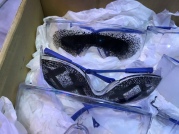














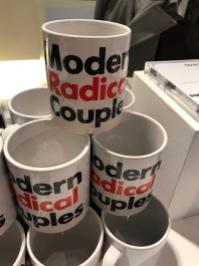



















































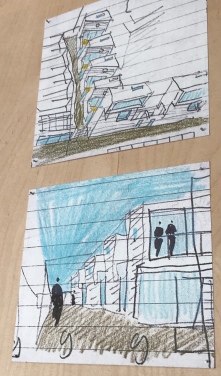
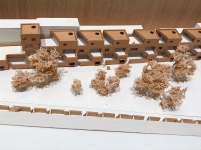


















 I just had my bi-monthly supervisory meeting with my Ph.D. student from London South Bank University, Thomas Empson. I really enjoy these meetings because Thomas is firing all cylinders and his work in sustainable production is moving full speed ahead.
I just had my bi-monthly supervisory meeting with my Ph.D. student from London South Bank University, Thomas Empson. I really enjoy these meetings because Thomas is firing all cylinders and his work in sustainable production is moving full speed ahead.












